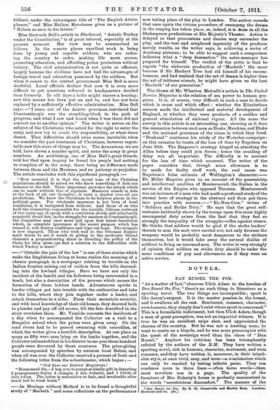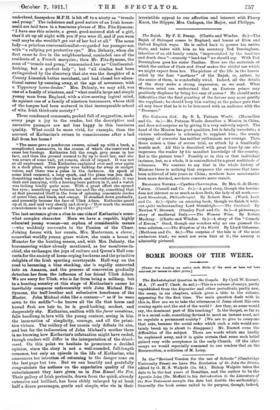NOVELS.
DAN RUSSEL THE FOX.
"As a matter of fact," observes Ulick Adare to the heroine of Dan Russel the Fox, " there's no such thing in literature as a sporting novel. The two things are incompatible ; sport is. likeAaron's serpent. It is the master passion in the breast, and it swallows all the rest. Sentiment, romance, character,. even humour, they simply don't exist where sport is concerned." This is a formidable indictment, but then Ulick Adare, though a man of great perception, was not an impartial witness. It is• true he was an excellent snipe shot, and appreciated the charms of the country. But he was not a hunting man ; he went to meets on a bicycle, and he was more preoccupied with.' the quest of the sovereign word than the chase of " Dan Russel." Anyhow his criticism has been triumphantly refuted by the authors of the S.M. They have written a. sporting novel, rich in huthour, character, sentiment, and even, romance, and they have written it, moreover, in their inimit- able style, at once vivid, easy, and terse—a combination which. can only be reached by taking infinite pains. They can condense more in three lines — often three words—than most novelists can in a page. The quality of the furniture of Mrs. Delanty's house is perfectly summarized in, the words "meretricious discomfort." The manner of the * Dan .R11684 the For. By B. O. Somerville and Martin ROM London. Methuen and Co. [6s.]
underbred, finespoken is hit of to a nicety as "treacle and pomp." The indolence and good nature of an Irish house- maid are laid bare in a luminous phrase of Mrs. Fitz-Symons :
"I have one this minute, a great, good-natured slob of a girl, that'd sit up all night with you if you were ill, and if you were.
--well maybe she wouldn't get out of her bed at all." The same. lady—a priceless conversationalist—regarded her younger son
with "a rallying yet protective eye." Mrs. Delanty, when she -first- came to live in the neighbourhood, reminded one of the residents of a French marquise ; then Mr. Fita-Symons, the
nian of " treacle and pomp," summarized, her as " Continental- looking, but & perfect. lady "; but "all similea had been: extinguished by the discovery that she was the daughter of a
County Limerick butter merchant, and had closed her educe-, tional career by running away, at the age of seventeen, with a Tipperary horse-dealer." Mrs. Delanty, we may add, was one of a family of nineteen, and " what could a large and simple young man from England, with a slow-moving logical mind,. do against one of a family of nineteen- buccaneers, whose skill of the tongue had been matured in that incomparable school
of wits, Irish third-rate society? "
These condensed comments, packed full of suggestion, make every page a joy to the reader,. but the descriptive and narrative passages are not less happy in this luminous. -quality. What could, be more vivid, for example, than the account of Katharine's return. to consciousness after a bad. fall from her horse ?
" The mare gave a ponderous, swerve, mixed up with a buck, a. 'complicated ma/tome:re, in the course. of which she contrived to cross her forelegs. Katharine, felt the rough grey, mane. in her face, and then the ground seemed to fly up to meet her, and she was aware of some vast, yet remote, shock of impact. It was not at all unpleasant. This ICatbarine explained over and over again in a dark place, where people were talking- far away in midget voices, and there was a pulse in the darkness. An epoch of some kind: occurred. a long epoch, and the place was less dark. Something under her cheek was harsh and uncomfortable; it was drab and annoying, with a herring-bone pattern. in it, and a watch was ticking loudly quite near. With a. great effort she opened her eyes ; something was between her and the sky, something that at first presented iftelfin the form of spinning concentric circles of azure blue, and black, and. orange. It steadied down gradually, and presently became the face of Illiek Adare. Katharine gazed. up. at it, and.said very clearly end.slowly—' How much the mental consciousness is in advance of the physical ! '" The last sentence gives a clue. to: one side of Katharine's some- what complex character. Here we have a capable, highly
. educate& young woman—an. orphan of considerable means —who suddenly succumbs to the Passion of the. Chase. .Joining forces with her cousin, Mrs. Masterman, a clever, somewhat worldly young grass widow, she rents a house in Munster for the hunting season, and, with Mrs. Delanty, the buccaneering widow already mentioned, as her monitress-in- chief, she exchanges the joys of culture and Queen's Hall con- certs.for the society of horse-coping. buckeens and the primitive delight& of the Irish sporting countryside. Half-way on the road to becoming a blue stocking, she is rapidly converted • into an Amazon, and the process. of conversion. gradually detaches, her from the influence of her friend Mick Adareo We are sorry for Mick, who, is far from being a milksop, but in a hunting country at this stage of Katharine's career be inevitably compares unfavourably with John Michael Fitz- Symons, the half-brother and submissive• henchman of the Master. John Michael rides like a centaur—" as if he were sewn to the saddle"—he knows all the ills that horse and
hound flesh are heir to, he is good-looking, modest; and desperately shy. Katharine, smitten. with the furor venaticus,
falls headlong in love with the young centaur, seeing in him the incarnation of simplicity, courage, and all the primi- tive virtues. The raillery of her cousin only defeats its aim, and but for the indiscretion, of John. Michael's mother there is no knowing, how Katharine's. infatuation might have ended,
though readers will differ in the interpretation of the denoil- Inent. On this point we hesitate to pronounce a decided opinion, since the story is not a. well-rounded, full-length -romance, but only an episode in the life of Katharine, who announces her intention, of. returning to the danger zone on the last page but two. But we can heartily and gratefully congratulate- the authors on the superlative quality of the entertainment they have given us in Dan Russel the Fox. Their gallery of Irish portraits, drawn from the quick, already extensive and brilliant, has been richly enlarged by at leash iisTI a dozen personages, gentle and simple, -who vie hi their irresistible appeal to our affection and interest with Flurry Knox, the Slipper, Mrs. Cadogan, the Major, and Philippa.































































 Previous page
Previous page